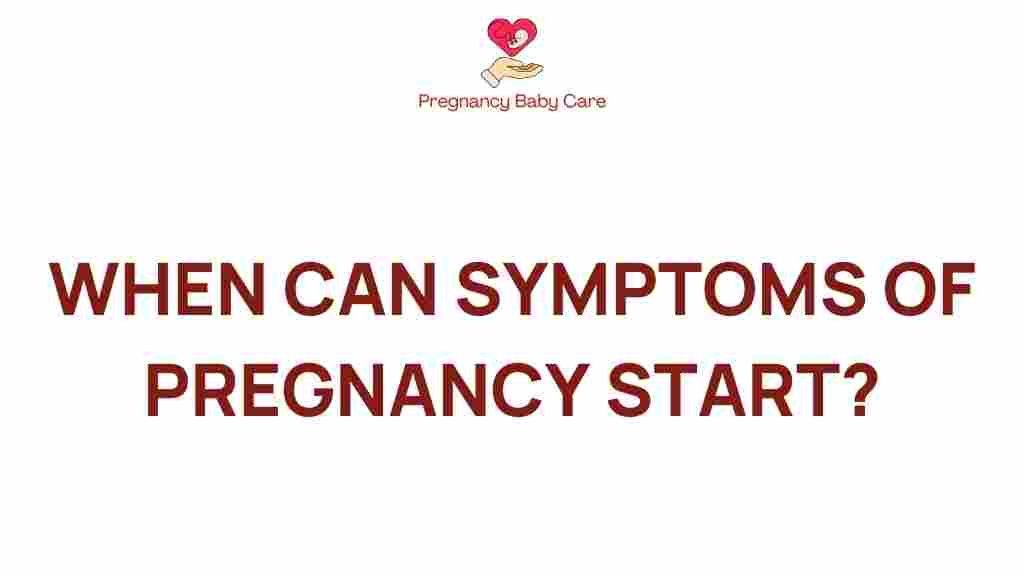Unraveling the Mystery: When Do Pregnancy Symptoms Begin?
Understanding the onset of pregnancy symptoms can be a puzzling experience for many women. The journey to motherhood is filled with excitement, anticipation, and often a barrage of questions. When do pregnancy symptoms begin? How can one differentiate between early signs of pregnancy and other conditions? This article aims to clarify these queries, helping women navigate their first trimester with confidence.
What Are Pregnancy Symptoms?
Pregnancy symptoms refer to the physical and emotional changes that occur in a woman’s body following conception. These symptoms can vary significantly from one woman to another, and they may also differ from one pregnancy to another. Some of the most common early signs include:
- Nausea: Often referred to as “morning sickness,” nausea can occur at any time of the day.
- Fatigue: Increased tiredness is a common symptom due to hormonal changes.
- Missed Period: One of the most significant early signs of pregnancy is a missed menstrual cycle.
- Breast Changes: Tenderness or swelling in the breasts is frequently reported.
- Frequent Urination: Hormonal changes can lead to increased urination.
These early signs are often the result of hormonal changes in a woman’s body, primarily due to the production of human chorionic gonadotropin (hCG) and progesterone. Understanding when these symptoms begin can help women prepare for the changes ahead.
When Do Pregnancy Symptoms Start?
Pregnancy symptoms typically begin within a few weeks after conception. Here’s a breakdown of what many women can expect during the early stages:
- 1-2 Weeks Post-Conception: Some women may start to notice subtle changes, such as slight cramping or spotting, known as implantation bleeding.
- 3-4 Weeks Post-Conception: This is when common symptoms like nausea and fatigue may start to manifest.
- 4-6 Weeks Post-Conception: By this time, many women report a missed period, which is often the first clear indicator of pregnancy.
It’s essential to note that while some women may experience these symptoms early on, others may not notice any significant changes until later in their first trimester. Each woman’s body is unique, and the timing can vary.
Understanding Hormonal Changes
Hormonal changes play a crucial role in the onset of pregnancy symptoms. After conception, the body undergoes significant hormonal shifts to support the developing fetus. Here are some key hormones involved:
- hCG (human chorionic gonadotropin): This hormone is produced shortly after conception and is responsible for many early pregnancy symptoms. It helps maintain the corpus luteum, which produces progesterone during the early stages of pregnancy.
- Progesterone: Levels of this hormone rise significantly during pregnancy, contributing to fatigue and changes in mood.
- Estrogen: Increased levels of estrogen can lead to breast tenderness and other physical changes.
The fluctuations in these hormones can lead to a variety of symptoms, which can be both exciting and overwhelming for expectant mothers.
Identifying Early Signs of Pregnancy
For many women, the first indication of pregnancy is a missed period. However, there are several early signs to be aware of:
- Nausea and Vomiting: Often starting around the fourth week, nausea can be one of the most distressing early symptoms.
- Fatigue: Many women feel an overwhelming sense of tiredness due to hormonal changes.
- Breast Sensitivity: Changes in the breasts, including tenderness or swelling, can occur within weeks of conception.
- Food Cravings or Aversions: Changes in appetite are common and can lead to cravings for specific foods or aversions to others.
Being aware of these early signs can help women recognize the possibility of pregnancy sooner, allowing for timely medical consultation and care.
How to Confirm Pregnancy
If you suspect you might be pregnant based on the symptoms you’ve experienced, here are steps to confirm your pregnancy:
- Home Pregnancy Test: These tests detect the presence of hCG in urine and are available at most pharmacies. They are most accurate when taken after a missed period.
- Consult a Healthcare Provider: For a definitive diagnosis, it’s advisable to consult a healthcare provider who can conduct blood tests and provide guidance.
- Ultrasound: An ultrasound may be performed to confirm the pregnancy and check for the developing fetus.
Confirming pregnancy as early as possible is essential for ensuring proper prenatal care and addressing any questions or concerns you may have.
Troubleshooting Common Pregnancy Symptoms
Experiencing pregnancy symptoms can be challenging, but there are ways to manage them effectively. Here are some common issues and tips for relief:
- Nausea:
- Eat small, frequent meals throughout the day.
- Stay hydrated and consider ginger tea or crackers to ease nausea.
- Avoid strong smells that may trigger nausea.
- Fatigue:
- Prioritize rest and sleep whenever possible.
- Engage in light exercise to boost energy levels, like walking.
- Maintain a balanced diet rich in nutrients.
- Breast Tenderness:
- Wear a supportive bra to alleviate discomfort.
- Consider warm compresses for relief.
Listening to your body and seeking support from healthcare providers can significantly enhance your comfort during this transformative period.
Conclusion
Understanding when pregnancy symptoms begin and what to expect during the first trimester is crucial for every woman embarking on this journey. From missed periods to hormonal changes, the early signs of pregnancy can vary, but they are all part of a beautiful transformation. Recognizing these symptoms early on allows for better preparation and care.
Whether you are experiencing nausea, fatigue, or any other early signs, remember that you are not alone. Many resources are available to support you during this time, including healthcare professionals and community groups. For more information on women’s health during pregnancy, visit this resource.
As you navigate through your first trimester, stay informed, seek support, and cherish the exciting journey ahead!
This article is in the category Pregnancy and created by PregnancyBabyCare Team
